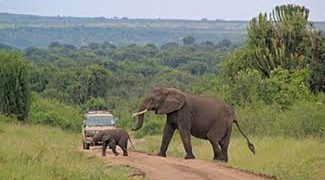President Yoweri Kaguta Museveni has disclosed that despite various challenges, such as the global impact of the Covid-19 pandemic, Uganda’s tourism sector remains robust.
During a televised address on Thursday evening ahead of the 38th Liberation Day of the National Resistance Army/Movement (NRA/M), Museveni reported a noteworthy 9 percent increase in tourism revenue—from USD 978.35 million in the financial year 2021/22 to USD 1,066.41 million in the financial year 2022/23.
The President attributed this growth to the growing confidence of travelers as the world recovers from the global shock of COVID-19, the allure of Uganda’s natural offerings, and the prevailing peace and security in the country.
Museveni outlined government initiatives aimed at further boosting tourism receipts to reach an annual USD 5 billion by 2028. He emphasized that the global tourism and travel industry is valued at USD 9.5 trillion.
According to the Uganda Bureau of Statistics (UBOS), foreign visitors to Uganda spent over Shs 4.6 trillion on tourism services in 2019, while domestic tourists spent approximately Ushs 3.0 trillion. The total, equivalent to about USD 2.0 billion, represents 0.02 percent of the global industry value. In 2021, the global number of tourists was approximately 965 million, contrasting with Uganda’s 1.5 million foreign tourists in 2019.
Museveni highlighted the potential for Uganda to significantly increase its share of tourism receipts in the global trade, suggesting that a fivefold increase to 0.1% could yield Shs 23.0 trillion per year (or USD 6.2 billion per year).
The President also addressed the misinformation propagated by ‘European and American politicians’ regarding security concerns and stereotypes about Uganda. He urged the aggressive dissemination of correct information through diplomatic channels and online platforms to present an accurate image of the country.
In addition, Museveni proposed measures to further enhance Uganda’s tourism receipts, including the activation of passage and cargo services at Kabalega International Airport (KIP) in Hoima, improvements in hotel capacity and sanitation, competitive pricing, professionalization, and diversification citing Meetings, Incentives, Conferences, and Events (MICE). He also recommended a training of multilingual tour guides, including proficiency in Swahili and Chinese languages, and expanded utilization of destination marketing agents, among other strategies.









